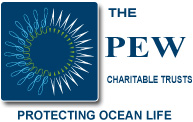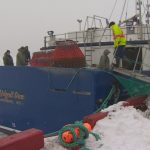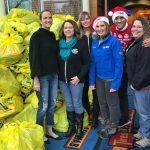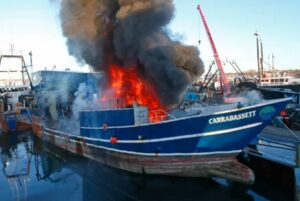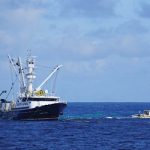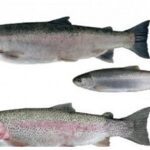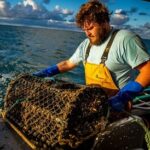Tag Archives: fish farming
Frankenfish ‘culled’ – Financial collapse kills AquaBounty salmon plans
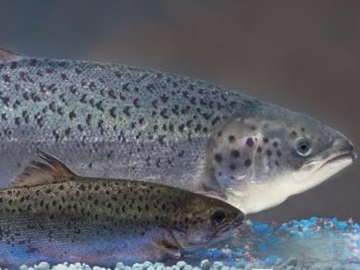 Score one for Sen. Lisa Murkowski, R-Alaska. AquaBounty Technologies, the Massachusetts-based company that claimed to have found “a better way to feed the world” with a genetically modified, faster-growing salmon, has gone bust. Always a faithful booster of Alaska’s commercial fishing industry, which saw genetically engineered (GE) fish yet another threat in market that has been running away from Alaska for a couple decades, Murkowski had branded the company’s salmon “Frankenfish” and spent years trying to get the federal government to ban it. She never succeeded in the regulatory arena, but victory appears to now have come thanks to in part to the public relations war she waged. more, >>CLICK TO READ<< 08:52
Score one for Sen. Lisa Murkowski, R-Alaska. AquaBounty Technologies, the Massachusetts-based company that claimed to have found “a better way to feed the world” with a genetically modified, faster-growing salmon, has gone bust. Always a faithful booster of Alaska’s commercial fishing industry, which saw genetically engineered (GE) fish yet another threat in market that has been running away from Alaska for a couple decades, Murkowski had branded the company’s salmon “Frankenfish” and spent years trying to get the federal government to ban it. She never succeeded in the regulatory arena, but victory appears to now have come thanks to in part to the public relations war she waged. more, >>CLICK TO READ<< 08:52
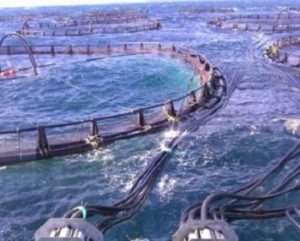
Don’t Cage Our Oceans: Fish farming may threaten rare Gulf whale
The site approved for the Velella Epsilon fish farm in federal waters west of Venice is one of just three potential aquaculture opportunity areas under consideration off Florida’s Gulf coast. There are six others — three in the central Gulf south of Louisiana and Mississippi and three east of Texas — as well as 10 in the Pacific Ocean off the California coast. It’s part of a collusive effort between fish farming companies and the federal government to divide up national waters for profit, James Mitchell, legislative director of Don’t Cage Our Oceans, said. >click to read< 13:49

Canada contemplating new Aquaculture Act
The Canadian government has started a public consultation process to help develop an Aquaculture Act. In a discussion paper on its website, DFO said the proposed Aquaculture Act would define in Canadian federal law — some for the first time — the many aspects of aquaculture, including definitions of aquatic species and the practice of aquaculture itself. “It is proposed that the Act would also be forward-looking by being inclusive of emerging aquatic species for cultivation, as well as enabling aquaculture in Canadian offshore waters.” >click to read< 11:38
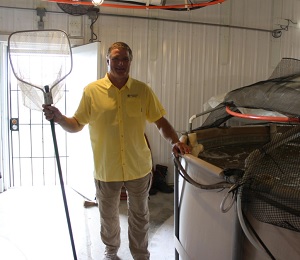
But, there is no sea in Kansas! Fresh Seafood In Landlocked Kansas? ‘I Can’t Grow It Fast Enough.’
When Bob Daniels started telling people he wanted to start a shrimp farm in the middle of Sumner County, the response was what you might expect. “‘You’re going to sell bait, huh?'” he said laughing while recalling one comment. “In fact, when we started looking to grow the shrimp and look for some financing … the local banker said, ‘Well, you’re never going to sell this.’ “Now, it turns out, I can’t grow it fast enough to sell what people were willing to buy.” >click to read< 10:22
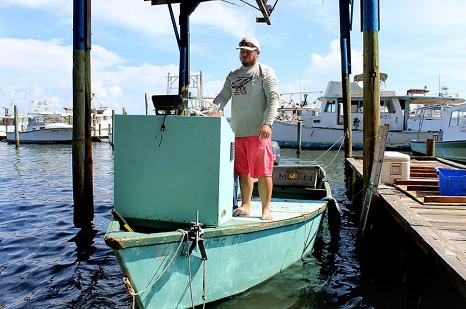
Opening a can of worms: Offshore fish farming in the Gulf of Mexico: Who benefits?
Velella Epsilon – the first fish farm in federal waters off the contiguous United States – would operate in the Gulf of Mexico, about 40 miles from Florida’s coast. Globe-shaped pens would hold fingerling almaco jack, a member of the amberjack genus, that would grow into 4-pound market fish within a year. The White House appears eager to open federal waters to aquaculture. With Executive Order 13921, President Donald Trump on May 7 ordered NOAA to winnow down regulations for both aquaculture and wild-caught fish.,, Ocean aquaculture is not without its environmental costs, such as escaped fish, parasites, and “fish sewage.” To James Bois, a commercial fisherman based here in Cortez, it’s unclear how a massive fish farm operation off the coast of Cortez will change his life. >click to read< 14:52
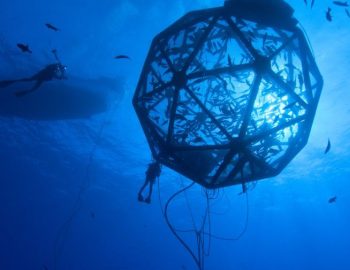
Feds select Gulf of Mexico Southern, California as potential zones for fish farming in the EEZ
The gulf joins Southern California in becoming a region for “Aquaculture Opportunity Areas,” the first two in the United States. President Donald Trump issued an executive order earlier this year outlining the concept as a way of boosting the country’s seafood industry and reducing its reliance on imported fish. The selection covers federal waters but does not identify more specific locations. “The creation of Aquaculture Opportunity Areas will foster the U.S. aquaculture industry as a needed complement to our wild capture fisheries,” said Chris Oliver, the assistant administrator for NOAA Fisheries, in a statement. >click to read< 14:14
 Commissioner Fried Welcomes NOAA Announcement – The announcement comes after Florida Agriculture Commissioner Nikki Fried sent a letter to the U.S. Commerce Secretary Wilbur Ross, asking that the department consider designating waters off Florida’s coast as an Aquaculture Opportunity Area. Echoing Commissioner Fried’s call were U.S. Senators Marco Rubio and Rick Scott, the National Aquaculture Association, the Florida Aquaculture Ass,,, >click to read<
Commissioner Fried Welcomes NOAA Announcement – The announcement comes after Florida Agriculture Commissioner Nikki Fried sent a letter to the U.S. Commerce Secretary Wilbur Ross, asking that the department consider designating waters off Florida’s coast as an Aquaculture Opportunity Area. Echoing Commissioner Fried’s call were U.S. Senators Marco Rubio and Rick Scott, the National Aquaculture Association, the Florida Aquaculture Ass,,, >click to read<
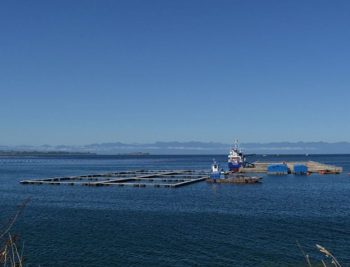
Latin America Reckons With a Fish-Farming Boom, industry cannot be allowed to harm ocean habitats
For a region plagued by stop-and-go growth, aquaculture is a boon. But problems have followed plenty. The blue revolution may not be as damaging to the environment as the one that reinvented global agriculture (farmed fish consume far less feed and energy than chickens, pigs or cattle do), but algae blooms, pests and pathogens, and overuse of antibiotics do a lot of dirty work. Chile repeatedly has seen huge schools of farmed fish break out of pens into the open ocean, where they threaten to overrun wild species and spread new diseases. >click to read< 14:58

Wilbur Ross opens new front in trade war with $11M in fish farm grants
Commerce Secretary Wilbur Ross doled out $11 million Wednesday aimed at jumpstarting the U.S. aquaculture industry, or fish farming, and limiting dependence on foreign seafood imports. “With such vast coastlines, there is no reason the United States should be importing billions of pounds of seafood each year,” Ross said. As part of Wednesday’s announcement, the agency’s National Oceanic and Atmospheric Administration is launching 22 projects aimed at expanding sustainable U.S. ocean, coastal, and Great Lakes aquaculture>click to read<14:42
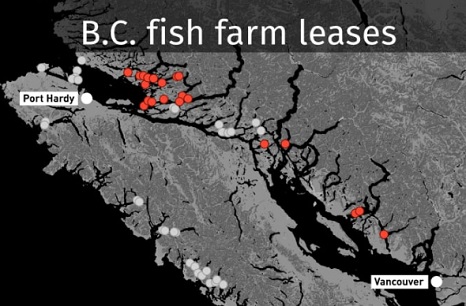
It’s wild salmon health vs. money and jobs as B.C.’s fish farm fight comes to a head
For some, salmon farms are a blight on the landscape. Not for the way they look, but because of the threat they believe these large aquaculture operations pose to wild salmon. “We’re pretty confident this place will have to be dismantled,” says Ernest Alfred, pointing at the farm from the boat. “And I’ll be here to watch it.” The government is currently reviewing the leases of 20 fish farms that expire on June 20. Alfred and other opponents are upping the pressure on the NDP leadership in hopes they will commit to ending fish farming in the ocean. But supporters of the farms say that would be a huge blow to an industry worth billions of dollars to the province. >click to read<12:01
Meanwhile, in Scotland, A bid by the Scottish Government to resolve fierce arguments over how fish farms harm wild salmon has been dismissed as a public relations stunt by campaigners. The population of wild salmon in Scotland has fallen by 50 per cent from around 1.25 million in the 1960s to 600,000 in 2016. Angling groups point out that most of the decline is on the west coast, close to where salmon farms are located. >click to read<
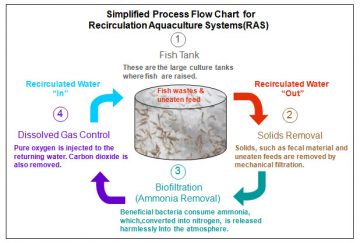
Fish Farming – Bio-security for Fish Rearing: Re-circulating Aquaculture Systems
Re-circulating Aquaculture is a technique for raising water borne animals in a closed (usually indoor) system which minimizes water consumption, provides maximum control of the livestock’s environment, and reduces the risk of exposure to parasites, disease, and predators High Density Re-circulating Aquaculture System (HDRAS) is a system in which aquatic organisms are cultured in water which is serially reconditioned and reused. Closed-system aquaculture presents a new and expanding commercial opportunity. Re-circulating aquaculture systems (RAS) are tank-based systems in which fish can be grown at high density under controlled environmental conditions. They are closed-loop facilities that retain and treat the water within the system. >click to read<09:33
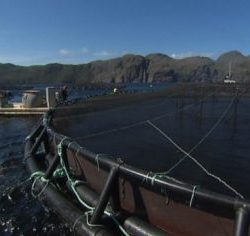
SURETTE: Open-pen fish farming a mess: How the world is passing us by
There’s big stuff happening in the dirty world of open-pen salmon farming. World production of farmed salmon is declining and prices are rising accordingly. The main culprit is sea lice grown immune to the chemicals used to wash them off, helped by algae blooms, fish disease, pollution, damaged wild stocks, and finally political disgust with the whole mess in the more enlightened jurisdictions. The move now, worldwide, is to either haul production to dry land or otherwise insulate the at-sea operations from the surrounding environment,,, >click to read< 18:28
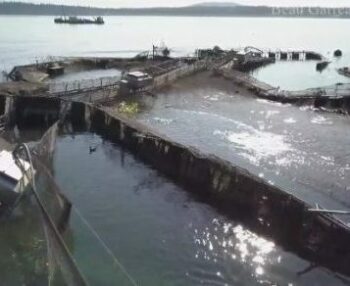
Structural Problems – Washington state fish farm’s collapse has reinvigorated salmon-farming debates
The Washington state fish farm that collapsed allowing many thousands of Atlantic salmon to escape into the Pacific showed signs of trouble last month, and was slated for upgrades. In late July, the Cooke Aquaculture-owned operation near Cypress Island required emergency work to stabilize the net pens after crews saw them moving in currents. Then last weekend, the same pens, containing 300,000 Atlantic salmon, began showing damage on Saturday before collapsing on Sunday, releasing an unknown number of fish. While the incident happened in Washington state, it’s reinvigorated the longstanding debate about fish farming on Canada’s West Coast, including the controversial but common practice of farming Atlantic salmon in Pacific waters. click here to read the story 08:26
Spill of farmed Atlantic salmon near San Juan Islands much bigger than first estimates – The farm held a total of more than 300,000 fish weighing some 3 million pounds. click here to read the story 11:15
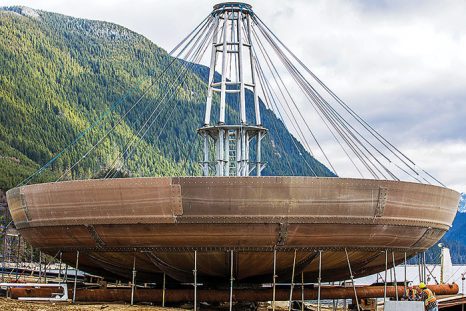
Bill C—228: Federal NDP MP proposes bill requiring fish farming be done in closed containment
Bill C—228, a bill that would require fish farming to be carried out in closed containment facilities, is on the table in the House of Commons and will be given a second reading sometime during the current session of Parliament. The private members bill was first introduced by Fin Donnelly, NDP MP for Port Moody —Coquitlam, in February, 2016. The bill amends the Fisheries Act. The proposed amendments state that licences for finfish aquaculture would not be issued unless they will be carried out in a closed containment facility and that no one shall carry out finfish aquaculture in Canadian fisheries waters off the Pacific Coast unless in a closed containment facility and with the proper license. Read the rest here 17:33
As fish farming grows, so does pollution from farming crops for fish feed, study suggests
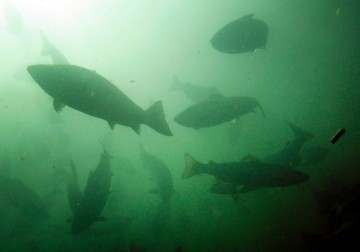 In an effort to make fish farming more sustainable, the aquaculture industry has been cutting back on feed made of other fish and replacing it with plant-based alternatives. But a new study warns that may make the fish less healthy to eat and have negative impacts on the environment. Many fish species that are farmed, including Atlantic salmon, the most farmed fish in Canada, are carnivores that eat feed traditionally based on fish meal and fish oil. Environmental advocates such as Greenpeace have criticized the practice as unsustainable, as wild fish that could be used to feed people or maintain wild populations need to be caught in order to produce the fish food. Read the rest here 10:20
In an effort to make fish farming more sustainable, the aquaculture industry has been cutting back on feed made of other fish and replacing it with plant-based alternatives. But a new study warns that may make the fish less healthy to eat and have negative impacts on the environment. Many fish species that are farmed, including Atlantic salmon, the most farmed fish in Canada, are carnivores that eat feed traditionally based on fish meal and fish oil. Environmental advocates such as Greenpeace have criticized the practice as unsustainable, as wild fish that could be used to feed people or maintain wild populations need to be caught in order to produce the fish food. Read the rest here 10:20
Ag Giant Cargill Is Spending More Than $1 Billion to Get Into Fish Farming
 Cargill, one of the largest agricultural companies in the world, is making big investments in aquaculture. On Monday, it announced a 1.35-billion-euro deal (roughly $1.5 billion) to purchase the salmon-feed-manufacturing company EWOS. This large purchase is just one of many for Cargill, which became part of a $30-million joint venture to build shrimp-feed facilities in July and has “aquaculture capabilities” in Mexico, Central America, China, United States, Southeast Asia, India, and Ecuador, according to the company’s press release. Read the rest here 14:25
Cargill, one of the largest agricultural companies in the world, is making big investments in aquaculture. On Monday, it announced a 1.35-billion-euro deal (roughly $1.5 billion) to purchase the salmon-feed-manufacturing company EWOS. This large purchase is just one of many for Cargill, which became part of a $30-million joint venture to build shrimp-feed facilities in July and has “aquaculture capabilities” in Mexico, Central America, China, United States, Southeast Asia, India, and Ecuador, according to the company’s press release. Read the rest here 14:25
Land-based fish farming cleaner, cheaper
 When considering the costs of growing fish, specifically Atlantic salmon in land-based operations, it is imperative that there be a level playing field. It can easily be shown that if ocean-based open pen operations were required to be environmentally sustainable, without government assistance and no compensation for mass mortality, these farms would in fact be an economic disaster. Read more here 13:04
When considering the costs of growing fish, specifically Atlantic salmon in land-based operations, it is imperative that there be a level playing field. It can easily be shown that if ocean-based open pen operations were required to be environmentally sustainable, without government assistance and no compensation for mass mortality, these farms would in fact be an economic disaster. Read more here 13:04
Fish farming killing off native species; boycott farmed salmon before it’s too late
![]() (NaturalNews) Equally as menacing as the potential release of genetically-modified (GM) salmon into the wild, factory fish farms are a modern scourge responsible for killing off droves of native fish species all around the world. And unless immediate action is taken to address this problem – continued
(NaturalNews) Equally as menacing as the potential release of genetically-modified (GM) salmon into the wild, factory fish farms are a modern scourge responsible for killing off droves of native fish species all around the world. And unless immediate action is taken to address this problem – continued
Lockheed Martin’s Technology-Infused Mobile Fish Pen
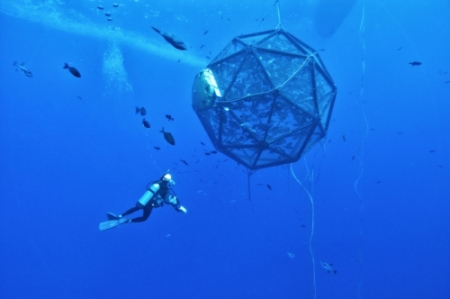 The inability of wild fisheries to supply the burgeoning demand for healthful and protein-rich seafood has given rise to a robust aquaculture industry that has helped alleviate the threat of overfishing in the world’s oceans.Lockheed Martin has teamed with Kampachi Farms of Hawaii and Illinois Soybean Association to develop an innovative new system that could produce a sea change in fish farming. Read more
The inability of wild fisheries to supply the burgeoning demand for healthful and protein-rich seafood has given rise to a robust aquaculture industry that has helped alleviate the threat of overfishing in the world’s oceans.Lockheed Martin has teamed with Kampachi Farms of Hawaii and Illinois Soybean Association to develop an innovative new system that could produce a sea change in fish farming. Read more






